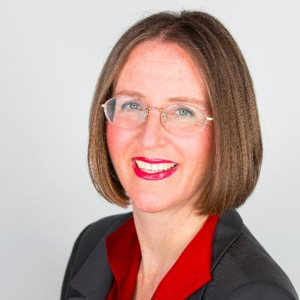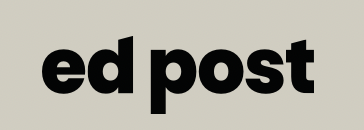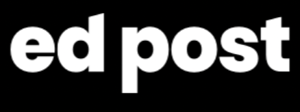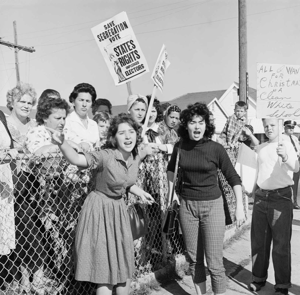Story
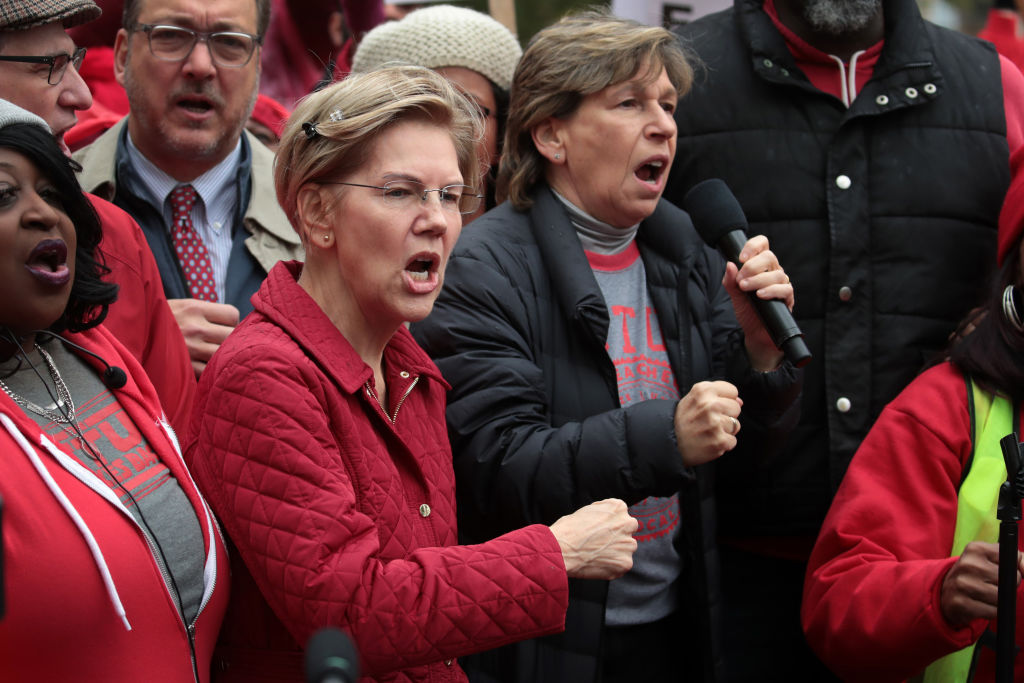
Video
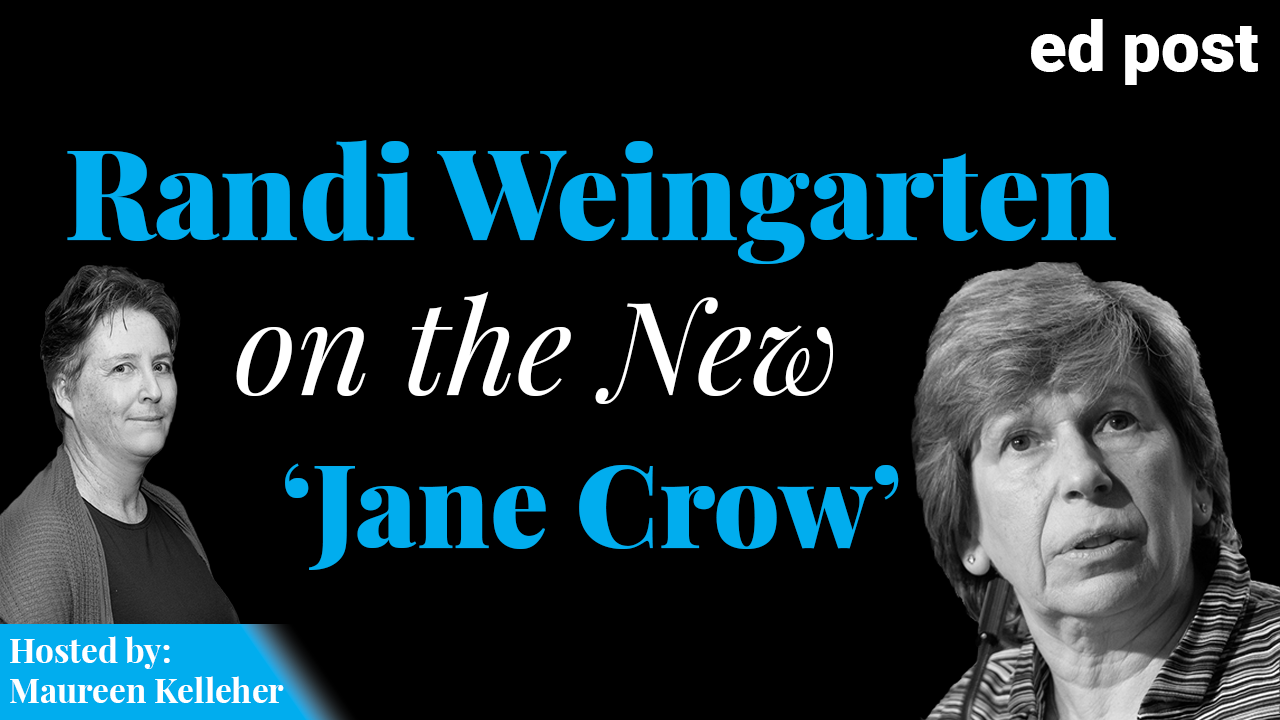
Teachers Union Leader Randi Weingarten on the New Jane Crow
'Our job, if we have privilege, is to use it to change society's biases. And to try and make this a more perfect union. And that's what I see my job as, regardless of where I am, whether it's within the union, community, or as a school teacher.'
Transcript of the Interview:
Maureen Kelleher:
Welcome to Ed Post Conversations. I'm your host, Maureen Kelleher. Many political observers are reading the November midterms as America's repudiation of the culture wars, educational gag orders and other efforts to assert a biased agenda in schools. Yet Moms for Liberty, the high-profile group of women campaigning against so-called woke education, correctly predicted they would win about 150 school board races. That's about half of the races where they supported candidates.
As historians like Elizabeth McRae have shown, the agenda espoused by Moms for Liberty and other groups has roots that stretch back into the Jim Crow era. History has sometimes minimized the role of Jane Crow— white women upholding white dominance in schools. But white women, as moms, teachers and voters, have always been a powerful force in education, and not always for justice.
What's next to fight back against Jim Crow education? Joining me now is Randi Weingarten, president of the American Federation of Teachers. Welcome, Randi.
Randi:
It is great to be with you.
Maureen:
Really appreciate you being with us. Let's get started. Randi, what’s your take on what the midterms mean, for the role of conservative mostly white moms in education politics?
Randi:
I think we actually have to think about who was funding these 1776 groups and Moms for Liberty groups.
Because there’s a lot of white moms and black moms and Hispanic moms and indigenous moms and, you know, Jewish moms and Catholic moms and Muslim moms, all of whom really, really want their kids to get a great education.
We’re out there, just basically saying no, not on my watch.
So I know that you know, the Moms for Liberty group may be disproportionately white, but I do think that you’ve got a lot more moms all over the country and, frankly, the world, that simply want their kids to have a shot in life.
And our job is to actually do a couple of things, which is to get in a very tangible way the resources: the curriculum, the programs and all that stuff that we need to do to help kids thrive, and to have the support to do that, and to do that in public schools.
And then our other job is to fight back on this kind of divisive culture war that presumes for one to do well you have to bring other people down. Part of what education is about and public education is about is no, you’ve got to lift everybody up, and you have to give more to the people that have the least and so we are constantly fighting against this demonization and this divisiveness.
And in some ways, when you do that, it makes you a target. Because you're saying no, all kids matter. Not some kids matter, all kids matter. And so it's been a year of having to try to do three things at the same time.
Having to fight this injustice. I mean, look, standing up and saying we have to teach honest history and you cannot whitewash slavery is a really important thing. Standing up and saying whether it’s Jim Crow, Jane Crow, it is not [acceptable].
There are things that are tough to understand and learn and are conflictual. You really want to have a good teacher who gets kids through conflicts, as opposed to avoids conflict.
So the whole issue of how we teach all kids and how we teach hard stuff is really important. That was number one.
But number two is, we had a huge amount of anxiety, which the right wing and the extremists exacerbated and exploited. And so you had, you have a lot of those wars as well.
I'll get back to number two in a second because number three is you’ve got to deal with all that.
And you still have to help, you have to deal with the real effects of that, like learning loss and two years of a pandemic. So we have to deal with equity issues, we have to deal with academic issues, and we have to deal with the effects of a terrible pandemic.
And so it's made it harder if you’re the ones who are trying to deal and be problem solvers in all this uncertainty and all this anxiety. You know, it’s easier for a group like Moms for Liberty that wants to be divisive, divisive, divisive to find something to be divisive about.
And we're the ones who are like, no, it’s about all kids, and making sure that the kids who have suffered the most or have had the least, we have to help them the most.
Maureen:
Right. So I’m a little concerned, honestly, that the midterms might be an opportunity for us to back off on number one a little bit. Oh, whew, they didn't take the Senate. They didn't go as deep in the House. But, can we step back? Can we take a break?
Randi:
Nope, nope, nope, no.
What we can do is [look at] the midterms. I think in the close races, you’re seeing not just in the midterms, but you saw in Montana, you saw in Wisconsin, you saw in New York, you saw in New Hampshire, all the places that had school board races beforehand, that basically, the pro-public education candidates were winning 75 to 80%.
Now, the Moms for Liberty folks will say they won half of the races that they were in, but they weren’t in a whole lot of other races.
If you canvass around the country, as Ballotpedia and others are doing, you’re seeing a 70 to 80%. But more importantly, the places where they really try to make this an issue, with the exception of DeSantis, all the other places where they tried to make this an issue, Wisconsin, Michigan, Arizona, you see what the election results are?
So I think what that says Maureen is, it says that we’re on the right track. And it’s not a womb, it’s a relief moment. But relief comes with responsibility, that we have a responsibility to help really focus on opportunity, equity, justice and how do you do that? You find pathways, and you work on pathways to help all kids succeed.
Maureen:
Thank you. Let’s take a look inside schools. Research shows that educators of color benefit all students, but often they are the least senior teachers and the first to go in layoffs. Given the importance of seniority to most teacher unions, how can they help retain more educators of color?
Randi:
Well, I think there's three things, and look, look what our local did in Minneapolis, in dealing with these issues. They, you know, [are] where we have done something. So I’m a little worried about what the Supreme Court is going to do in terms of the affirmative action case in Harvard and North Carolina, which we are supporting in an amicus brief that says that, you know, there are effects of past discrimination, and you have to adjust for those effects.
What I think you’re seeing in Minneapolis is trying to figure out ways of, creating adjustment for past effects and making sure that we really are intentional about diversity. And that’s what they did in the Minneapolis contract. But I think there’s a long term better way, which is, we should not be in this moment in time, in a situation with public schools about scarcity. And you know, where and right now, what we know in the next several years, is that we really need to have adults who know what they're doing teaching children and children really need to be seen, which means diversity is really important.
So it’s not simply what American Rescue Plan did to create, you know, some short-term investment into schools, we need to have the long-term investment in schools in terms of the pathways of hiring into teaching, and to keep people in teaching. And so Grow Your Own programs and all these other programs are really important to recruit and retain with a real focus on diversity.
Maureen:
Right, I'm a big fan of Grow Your Own, too. I wanted to jump back to Minneapolis for just a second, though, because it's been pretty well reported that it actually took Black educators and their allies to work hard to make sure that that provision stayed high on the local leadership's agenda. And so I just want to talk to you about
Randi:
it's not true. The local leadership made it high on their agenda from the beginning. And in fact, the vice president of the local is the woman who has been personing George Floyd Square for a long time. What’s happened in our unions is we’re actually having more conversations about equity than anybody gives us credit for, but they’re hard, their conversations where we’re really listening to each other, we’re seeing it in terms of LGBTQ issues, we’re seeing it in terms of black and brown issues.
And frankly, some people have criticized me for not being as public all the time. I think I’m pretty public about being the first out lesbian, labor leader in the United States. But, you know, people have said to me, you need to talk about it more to be more intentional, so that people see this and see those pathways.
And I never actually really thought about it that way. And so I think what’s happened is, over the course of the last five to 10 years, our locals have been much more intentional about how do we recruit, retain and diversify our teaching force? And how do we do this in a way that’s fair?
And, you know, we see others like the paraprofessional career ladder program in New York and in Baltimore. So the issue, I think what you’re seeing is that people are really trying to work out fairness and fight scarcity, but have fairness be there.
You know, I’m very close to that local, I’ve watched it for a long time, it got a bad rap, in some aspects of the community, because they didn’t see what the local was doing. But they have really been grappling with the issues of race in Minneapolis for a long time, and have really tried to ensure that teachers of color are being treated fairly.
Maureen:
I appreciate your take on that situation. I want to talk a little bit more broadly about some of the issues that just came up as you were speaking. How do locals and how do unions work with districts to create—we know, I mean, every HR survey, there’s national surveys, teachers of color often don’t have the kind of collegial experience we wish that everyone could have in schools. And what can you do, as the leader of the most powerful union labor union in the U.S. and like deeply involved in schools, to create workplaces that are not only legally free of bias, but places where people can bring their full selves to classrooms and with colleagues.
Randi:
I think that this is where culture and strategy and community really, really matter. We have to create and maintain communities of inclusion in school, and where we see each other and build relationships. That’s part of the reason why I said what I said before about, you know, several of my leaders have come up to me and said, you will help us do more, if you are intentional about your own sexuality.
And in terms of just showing that that's important to acceptance and to seeing each other. And so what we’ve tried to do, so for example, we did a big task force recommendation on shortages earlier in the year. And we were very intentional about diversity being an important concept.
Part of the reason that we have fought back against [CRT] by not simply saying [‘oh, we don’t teach CRT’].
I think in retrospect, saying, Oh, we don’t teach CRT, I mean, it's just, you know, that was not the right response. The right response was we teach honest history, and we can’t shy away from the struggles and the way hopefully American history bends towards justice, but it doesn't do it on its own.
And so when you lift up the struggle, and lift it up in all of its facets, it starts creating community. When you see each other, when you celebrate, not in a Hallmark way, but when you celebrate various different holidays, and the reasons for them— like Juneteenth, you’re starting to tell not only a history, but using it to create community more broadly. When you celebrate Gay Pride Month, when you frankly celebrate, you know, all the different holidays around December.
So I’m saying that this is thinking about how to use different moments in time, and how to bring people relationally together, so that you create a workplace where people want to be. I often say, I’m sure you’ve heard me say, every single public school should be a place where parents want to send their kids, educators want to work and kids thrive.
So you know, that’s not standards-based, that’s emotional-based. You know, that's an emotion, that's a sense that you're not waking up with a pit in your stomach or pit in your throat.
What then become the vehicles by which people feel like they have agency, like they have voice? And we have to be intentional about those vehicles. And they'll look different in different places, because culturally, they'll look different. But you have to be willing to engage in the strategy of making this happen.
It has to be a value, a value that there's a safe and welcoming workplace, and a safe and welcoming education and learning space for kids, and for adults that are with kids.
Maureen:
Right. So again, education research shows that kids benefit from an environment where teachers are both warm and personable, and hold them to high expectations academically.
At brightbeam we talk a lot about the belief gap, because unfortunately, we have seen it.
I mean, I've personally seen it, I’ve witnessed it as a person, as a reporter, as a parent. Too many educators think the goals too many educators think the goals low-income Black and Brown children can accomplish are very different, and frankly, not as ambitious as the far greater goals those students and their families have for themselves. How do we create schools where there are high expectations that are shared and clearly communicated between families and educators?
Randi:
The key really is not the goal or the value, but what are the steps we need in different schools to make that happen? I often watch the faltering of lots of great initiatives, because you'll have somebody walk in and say, OK, we're now Standards 2000. And there'll be a 5-minute orientation. And then, “OK, do it on your own.”
So I think what happens a lot, is that left to people's own devices… People wouldn’t be teachers if they didn't want to make a difference in the lives of kids. But sometimes, a lot of times, a lot of times, we don’t know the house, and what ends up happening, I’ll give you this, the bugaboo that I'm fixated on right now: testing and paperwork.
This is a moment that we should really be doing much more project-based instruction. We should find things that kids really love and we should be teaching through that. And that should be a motivator for getting kids into school and staying in school, whether it's art, music, cybersecurity, robotics, whatever it is, what are the avenues.
I'm a big believer in project-based instruction. And you know, I was a social studies teacher, I'm still actually on leave from Clara Barton High School.
So, you know, that goal, I only taught Black and Brown kids. So, sometimes they really hated me, because I was really hard on them. If we were doing debate preparation, I wouldn't let them just leave. And then I remember one day, on a Saturday, bringing my dog into Clara Barton, they all love my [dog]. OK, you can pet the dog for a little while. But we're going back to my asking you questions about the Constitution, you know.
So all I'm saying is, some of it has to do with the way in which we structure schools, and where we don't create, we don't create enough flexibility. So that we're actually using what kids really want and desire as a way of not only lifting of meeting their ambitions, but having the resources and the wherewithal and the time to match it to meet those ambitions.
And, and when you and when, and when kids are really bored with, you know, four hours of English because of testing, or teachers are spending all their time doing paperwork, as opposed to: how am I gonna meet…? I know where Maureen is, how do I get there? What do I need to do? How do I need to do that? So part of it is skill development. Part of it is flexibility.
Part of it, and I've watched this over the course of time, I've seen much less of this kind of innate, an ingrained bias I've just watched over the course of time. Younger people are much less biased than older people. And I've watched a huge sea change over the course of time in schools across America.
Maureen:
Right. I don't think the tide has swept out everything yet, though. Not from what we hear from our contributors.
Randi:
Yeah, no, I'm not, I'm not trying to wear rose-colored glasses. You see it in terms of the extremism now. I mean, you see, at the same exact time, as I'm watching a generation of young people in America be less biased. Look, I'm very cognizant of what just happened in some populist movements around the world, including in Israel. But at the same time, you got social media, you got a lot of hating going on. And you got a lot of tribalism and extremism. That’s very disconcerting. I mean, the Proud Boys … can just go through a litany of haters.
Maureen:
Right, and they didn't go away just because the scales tipped a certain direction politically.
Randi:
Yeah, but what I think happened is Trumpism has enabled them to be public in a way that the course of the last 20 years, the course of the 20 years beforehand, said it was not OK to be actively and offensively supremacist.
And now, you know, that, that, that enabling i is one of the the election denialism. You know, this better than I do, the aftermath of Brown versus Board of Education. I know the, I know, some people within the voucher and charter movement hate when I say this, but the history of the, in Virginia in the aftermath of Brown versus Board of Education, the history of so called, you know, choice in education was supremacist.
So I'm not, again, I'm not being rose colored, but what I am saying is that I am watching both our union, the NEA and a lot of people who want to go into teaching, they want to make a difference in all, in all kids. Sometimes we don't have the tools. But I'm seeing a generation two generations that have really wanted to go with their better angels.
Maureen:
Right. So many people think that the term white supremacy is confined to, you know, guys in sheep's and pointy hats running around, or the current Proud Boys or whatever. But those of us who really are deep in the work know that there's like a spectrum here and that those of us who grew up, I mean, I grew up in the suburbs, I was fortunate to be in a school system that desegregated in the 70s, under Brown. So my experience was a little different than it might have been if I were 10 years younger.
But still, there's a lot of unthought, unexamined stuff. I mean, I've been on this journey since college, when I had the great fortune to learn with Bell Hooks, right? It's been a 30-year journey. I was very lucky.
Maureen:
So I want to ask you a little bit about how you've grappled with these issues. And talk to me about a moment when you feel you really effectively used your position as a powerful white woman to improve education for young people of color could have been as when you were a teacher in school, it could be in your role now. But just a place where you feel like, hey, I really, I was really able to put my privilege to work.
Randi:
Well, first off, you have to want to put your privilege to work. And you have to understand that part of our responsibility, when we have privilege, is to fix the world. Tikkun olam, I say, in my spiritual space, and instead of beating yourself up about it, use it.
So I would say that one of the things that I've done of late on the book bans, for example, is, you know what, I think a lot about the two best lessons I ever had, in the tricks for the trade in teaching.
One was: it's not what you say, it's what's heard. And the second is something everybody uses, which is: meet people where they are. See them. Meet people where they are.
Take the book banning debate. If we have to try to meet people where they are, and it's what heard, not what you say. Initially, it was so offensive to ban books, you know, I would be like, ‘How could you do this, this is like a violation of the First Amendment?” You know, and be like fulminating, like, “Oh, my God, how is this happening right now, here in the United States?”
And I realized, we have to actually explain why this is so terrible, in a way that people can understand. And not just the people who would immediately love reading, you know, Toni Morrison's “Beloved,” or love reading “To Kill a Mockingbird,” a book, by the way, I used to teach in my street law class.
So I started using two books, you know, the Diary of Anne Frank, and books about Ruby Bridges. And I watched so part of my using my privilege and telling the story is, I have an obligation to teach in a way that people hear, listen and react to. That's part of what I have to do with adults, just like we did with kids.
So I have often, on the campaign trail, or in the last year, said, “Why would they ban a book like Ruby Bridges, or a book like The Diary of Anne Frank?” And virtually everyone in any audience I've talked to would be like, “Oh, my God, I read one of those two books!” Or maybe, “I read books about Ruby Bridges! And I know Anne Frank is.”
And I'd say, “Why do we teach these books? Because what we're doing is we're helping kids get to know other kids and their struggles, across race lines, across religious lines. Why would anybody want to stop us from doing that? Why would anybody want to stop us from having empathy for kids across race lines or religious lines? And their struggles and their sacrifices?”
So I think in telling that story, it's easy to tell the story about my kids at Clara Barton winning the We the People competitions and all of them being basically from the Caribbean or parents from the Caribbean and Black and Brown and you know how how amazing that was?
as as much for me as it was for them and their parents, that's an easy story to tell.
But our job, if we have privilege, is to use it to change society's biases. And to try and make this a more perfect union. And that's what I see my job as, regardless of where I am, whether it's within the union, and my membership, whether it's within community, or whether it is as a school teacher.
Maureen:
Thank you. Sometimes we talk about the moments where we miss it, we don't see something. The one that comes to me right now is less directly about race, but like just not knowing the people you're working with? Well, in my last teaching job, I had a really great, talented student, he had an IEP, and I didn't know, and I was an English teacher, I got a journal entry from him. And I thought he could I thought, like, you know, there were some issues with the writing. And like, I was kind of surprised. I was like, you could do better than this. And he was like, Ms. K, I have an IEP, I have like these things. I'm like, I did not know that. you know, sometimes we have to, like come down a little to meet people where they are. Could you talk about a time when you felt that your efforts to be an effective ally and advocate, there was a bump in there or asurprise, you didn't know? And like, you had to take a step back and kind of figure that out? Could you talk about what you could do talk about a moment like that, and what you learned from the experience?
Randi:
Sure. I mean, I look, I think that there's probably many moments like that, and the issues. So you know, during the whole, at the very beginning of the Black Lives Matter movement. You know, some of us, in the way in which we grew up, we had to just suck it up.
You know, if you're a woman moving up a power structure,if you're a gay woman, what we learned was to suck it up. And that's really terrible.
And what happens is that you're not getting the cues then of real pain that people have, and meet that pain. Because, you know, we learned a different learned behavior.
And so I've really tried to try to read the cues of seeing people, as opposed to, you know, my own kind of growing up where I had to just basically subjugate my own cues. And so that's been a real learning process. And so sometimes I miss it. Sometimes I miss the cues of pain. Because, you know, I tried never to see my own.
Maureen:
Thank you. So we'll close out with this last question.
Randi:
Let me say one more thing, which is I have to be as a leader, I have to be willing, if somebody has the courage to say, “OK, you missed it,” I can't get defensive.
And that's a learned behavior, too. Because if you get defensive after somebody has the courage to say you missed it, you didn't see me, then people are going to not ever want to talk to you. So it's really trying to figure out how to see and how to be open enough that people will take risks and chances.
Maureen:
That's exactly what it's about. It’s creating the space where people can take that risk. Yeah, and a lot of it is letting down, like, the less instantly reactive we are, when challenged, the more space opens. Right.
So with that in mind, obviously there are and I know many of them, and many of them have contributed to our package.
Many white women who are in education who are on the front line of doing this kind of work, learning how to be more effective allies and you know, the term now is accomplice where you're actually aiding and abetting.
I have a couple good friends here in Chicago, who supported the effort to change Stephen Douglas Park to Frederick and Anna Douglas Park, because they were women, you know of a certain age and easily overlooked by cops.
They went and painted the s the extra s on all the signs in the park.
So what message would you have for white women educators who are really trying to become more effective advocates for students, closer partners with their families, and are still having these moments where we, you know, we get it wrong, we bump into things, people call us on our stuff, any messages from those of us in that space?
Randi:
Listen. Listen, and really listen and see. And we're going to get it wrong. But people will see your heart and people will see your soul, if you listen and people feel seen.
Maureen:
Terrific, thank you very much for being with us, Randi. We've really appreciated it.
Randi:
Take care.
